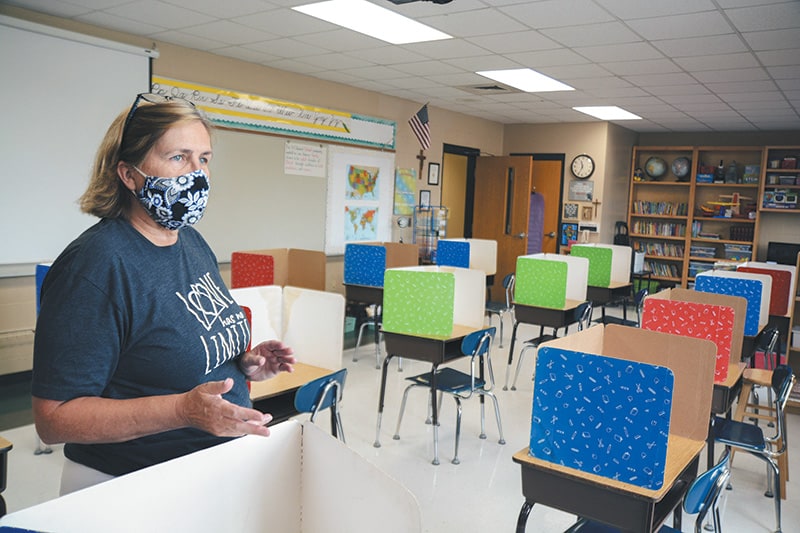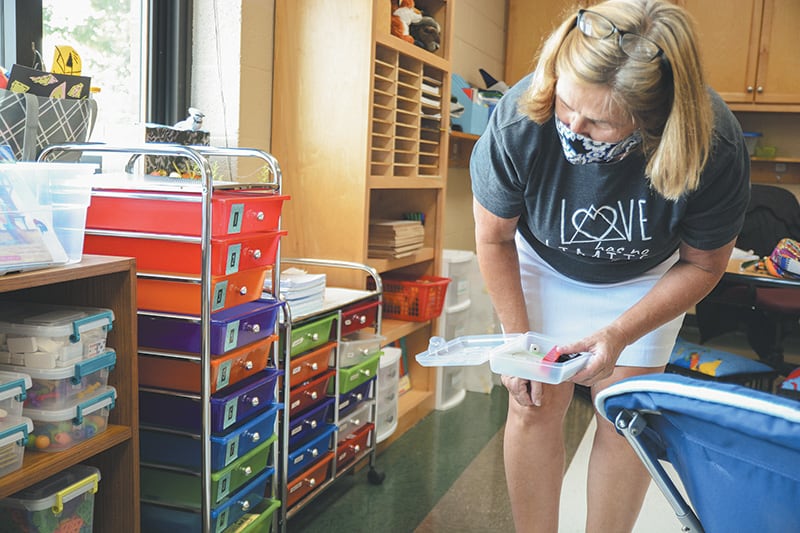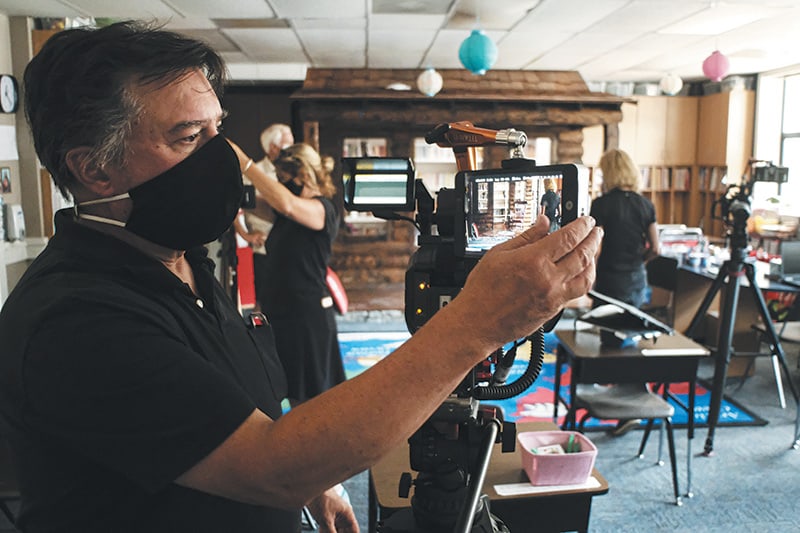
When students return to the Diocese of Nashville’s Catholic schools in early August, they will be armed with the must-have accessory of the moment: a face mask. They will have their temperatures checked on a daily basis; they will not be moving between classrooms as often; some will eat lunch in their classrooms or outside. They will sit at desks with dividers between them and their classmates, among other adjustments necessary for in-person learning in the age of COVID-19.
Students at St. Ann School in Nashville will be asked to bring another unusual item to school this year: a beach towel. Beach towels can be “a great social distancer” for students when teachers move their classrooms outside, as some will on a regular basis this year, said St. Ann Principal Anna Rumfola.
Since the St. Ann campus has lots of space, and shade trees, teachers plan to utilize that much more than in the past, Rumfola said. They will also keep windows and classroom doors open when possible to promote better ventilation and minimize the touching of common surfaces like doorknobs.
St. Ann has also installed enhanced air purifying capabilities in the school’s HVAC system to improve air quality and ventilation.
Planning for the safe return to school has “definitely been an all-summer project,” said Rumfola. “Things are constantly changing.”
‘Back to balance’
“Everything has to be re-aligned” as schools prepare to re-open in August, said Rebecca Hammel, superintendent of schools for the Diocese of Nashville.
With all the planning and preparation, “we really believe we’re going to offer a safe option for students to come to campus,” Hammel said.
The Catholic Schools Office has mapped out a plan that makes recommendations for all schools, but, she said, “every school has their own set of protocols reflective of the conditions in their own community.”
Even though the city of Nashville reverted back to a modified “Phase 2” of its reopening plan after an increase in COVID-19 cases, and Metro Nashville Public Schools announced they would not return to in-person learning until at least early September, Hammel is confident that the diocese’s Catholic schools are prepared for a safe return in early August.
With more autonomy and only a fraction of the students compared with MNPS schools, local Catholic schools “can be more nimble” about closing a classroom or individual school if needed, Hammel said. Catholic schools will also be ready to quickly pivot to distance learning if necessary, she added.
Dr. Alex Jahangir, Metro Nashville’s Coronavirus Task Force Chair, has said he supports local Catholic schools returning to in-person learning. “Given the safety measures to be in place at the start of the year, I support the Catholic schools in their decision to return to campus in August,” he said in a statement.
Hammel, a former classroom teacher and principal, emphasized the importance of in-person learning. “There’s a great need children have to be back together” in the classroom with their peers and teachers, she said.
The Catholic Schools Office has launched an ad campaign promoting the benefits of in-person learning with the themes of “back to balance,” and “now more than ever,” tapping into both parents’ and students’ strong desire to return to the routine of school. Some schools, including St. Ann, have received increased inquiries as a result and a small boost in enrollment.
Schools understand that some families do have reservations about the return to in-person learning. Some St. Edward School parents have expressed concerns about the risks involved in sending their children back into the classroom, said Principal Susan Blankenship. But at the same time, several new families have enrolled or are considering enrolling their children at St. Edward specifically because they will offer in-person learning, she said.
Blankenship has been referring to an article from the American Academy of Pediatrics that outlines the benefits of in-person learning. “Children thrive … through social actions and learning in schools and routine,” Blankenship said. “Our kids need this now more than ever.”
Minimizing the risks
“We’re having to relook at everything we do and decide if that needs to be altered or if that’s safe,” said Blankenship, who will start her first year as principal at St. Edward School after serving as a principal for Metro Nashville Public Schools for the last eight years.

“We want to make sure our students and teachers are safe,” she said.
“We want the kids to come back to school and be as normal as they can be, and still be kids,” said Lisa Rippy, who will be teaching fourth grade at St. Edward this year.
But things will be different when students return to in-person learning on Aug. 10. “There’s going to be a learning curve for these children,” Blankenship said.
The children will have to adjust to wearing a face mask during the day, which can be a challenge. “A lot of my teachers are testing different facemasks and shields,” Blankenship said. A clear plastic shield would help in teaching subjects like reading and phonics where it’s important for students to see the teacher’s mouth, she said.
The school also will be using study carrels, which are three-sided partitions that sit on a student’s desk if they are working independently. When using the study carrels, students will be allowed to take off their mask “because we know this is going to be hard for kids,” Blankenship said.
As Americans adjust to a “mask culture,” children are becoming more adept at using them for longer periods of time, said Rumfola, of St. Ann. “Do we like it? No. But it’s necessary,” she said.
At St. Ann, students are encouraged to choose their own masks in a fun pattern, so “they can look at it as an expression of their personality,” Rumfola said.
Schools are also making modifications for how students move through the halls, or don’t, this school year. At St. Edward, instead of junior high students moving to different classes for different subjects, as they normally would do, they will stay in their classroom and their teachers, with all their materials on a cart, will move to the students, Blankenship said. That will help avoid students sharing desks and other materials with other students, she explained.
For special classes such as music and art, the teachers also will move from class to class, Blankenship said.
Pope John Paul II High School in Hendersonville will modify attendance at the school’s weekly Mass; students will remain in their classrooms with rotating groups of students attending Mass in the auditorium. Communion will be distributed in the individual classrooms or the hallways.
Hand sanitizing stations will be placed in the hallways and throughout the school, and there will be two lunch periods to limit the number of students in the dining hall at one time.
There are significant benefits to in-person learning, “only if you’re able to take the precautions to minimize the risks,” said Mike Deely, head of school at JPII.
Everyone in JPII will be required to wear masks at all times, and the school is asking parents to check students’ temperatures before they leave for school. Their temperature also will be checked before they are allowed in the building. If someone’s temperature is above 100.4 degrees or they are exhibiting the symptoms of the virus – cough, congestion, shortness of breath, or gastrointestinal symptoms – they should stay home.
There will be assigned seating on the buses and riders’ temperatures will be checked before they are allowed on the bus.
“We’re prepared to go online, but we feel we’ve done the work to open in person,” Deely said.
‘A stressful time’
Although the re-opening of a suburban high school and a small elementary school in rural Lawrence County will not be exactly the same, both are following very similar guidelines as directed by the diocesan Catholic Schools Office. Those protocols and guidelines for reopening “have been very helpful,” said Shelly Stepp, principal of Sacred Heart School in Loretto, one of the oldest and smallest schools in the diocese.

“They were pretty much protocols for Davidson County schools,” Stepp said, and schools in other counties, like hers in Lawrence County, were advised to confer with local school and health officials and make adjustments as needed.
“We’ve not gone far from the diocesan plan,” she said.
Sacred Heart is making many adjustments for this year, and that includes lunchtime. “We will be doing grab-and-go lunches in disposable containers” and students will be eating in the school gymnasium, Stepp said. “We’ve got tables spread out. Each class will have assigned tables with no class sitting where another class has already eaten.”
“We’re going to even spread out our break time schedule so only one class is at break at a time,” Stepp said.
Sacred Heart has purchased plastic face shields for all its teachers and students in kindergarten through eighth grade, Stepp said. Although the pre-kindergarten students will not be required to wear a mask or face shield, the school is acquiring plexiglass barriers for the tables in that class, Stepp said. Sacred Heart also is limiting the use of play centers and instead providing students with individual supplies to limit cross contamination that might occur if multiple students use the same items.
Cleaning and sanitizing of the building will increase as well. “We’ve had to double our budget for janitorial supplies and services,” Stepp said.
“It’s been stressful” making all the necessary preparations to open school, she added. “It’s just a stressful time in general.”
Ready to adapt
Teachers at all of the diocese’s schools, whether in small towns or urban Nashville, are ready for students to come back, and ready to adapt their methods as necessary.
The St. Edward faculty’s approach to teaching during a pandemic may change over the course of the school year, Principal Blankenship said. “Some of it’s going to be trial and error and figuring out what’s working and not working.”
Until a change is necessary, Blankenship said, “We’re concentrating on doing in-person learning, doing it well, and doing it safely.”









